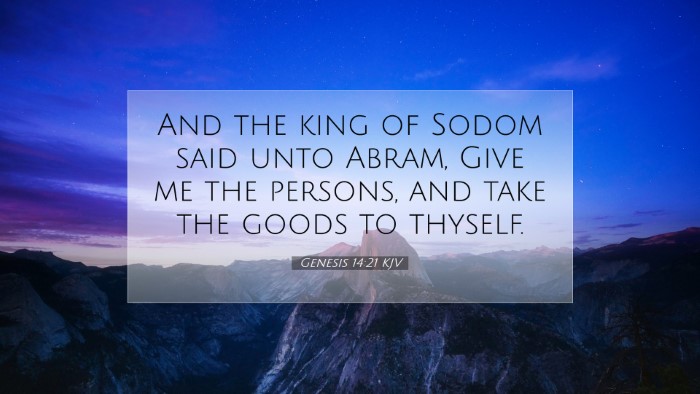Commentary on Genesis 14:21
Genesis 14:21 states: "And the king of Sodom said unto Abram, Give me the persons, and take the goods to thyself."
Contextual Overview
This verse emerges from a profound narrative concerning Abram’s military victory over the coalition of kings led by Chedorlaomer, where Abram rescues his nephew Lot and other captives from Sodom. The encounter with the king of Sodom reveals significant theological and moral implications.
Insights from Public Domain Commentaries
Matthew Henry's Commentary
Response to Victory: Henry emphasizes that Abram, having gained a remarkable victory, was approached by the king of Sodom who was eager to reclaim his subjects. Henry notes the king's request illustrates a pragmatic approach to leadership that values human lives over material possessions.
Moral Standing: The interaction reflects Abram's character; a man who understands the gravity of his choices. Instead of accumulating gains, Abram is defined by his moral fiber and generosity. Henry points out that true victory is not in material accumulation but in righteousness and the preservation of life.
Albert Barnes' Notes on the Bible
Sovereignty and Human Agency: Barnes reflects on the king's command to Abram, underscoring the nature of authority and surrender in warfare. The request to "give me the persons" indicates a desire from the king to reclaim the lives of his citizens, yet highlights the power Abram held over the situation.
Contrast of Priorities: Barnes notes the contrasting priorities of Abram and the king of Sodom. While Abram is depicted as a righteous leader prioritizing spiritual over temporal gain, the king’s willingness to negotiate based on material wealth signifies a worldly mindset. This contrast sets a stage for critical examination of values held by leaders.
Adam Clarke's Commentary
Historical Insight: Clarke provides a historical backdrop to the kings of Sodom and Gomorrah, suggesting that the request of the king illustrates a customary practice after warfare where victors were entitled to a share of the spoils. However, Abrams’ response to this practice diverges from the norm.
Focus on Covenant: Clarke emphasizes Abram's distinct choice to refuse the king’s offer. This reflects his commitment not only to divine covenant but also to a higher ethical standard. Abram’s alignment with the divine purpose is evident as he navigates the affairs of earthly rulers.
Theological Implications
Divine Sovereignty: The interaction between Abram and the king of Sodom raises questions regarding divine sovereignty in human affairs. The outcome of the conflict and the subsequent negotiation suggest God’s hand at work in establishing leaders who would honor godly principles over material gain.
Community and Responsibility: The verse prompts a reflection on communal responsibility in spiritual leadership. Abram’s willingness to act in the interests of those who are vulnerable, rather than in pursuit of personal gain, serves as an exemplar for modern-day leaders. His model is one of servanthood amidst authority.
Application for Contemporary Readers
The story of Abram's encounter with the king of Sodom is rich with lessons for pastors, students, theologians, and scholars:
- Ethical Leadership: Leaders should prioritize justice, righteousness, and the well-being of others over selfish ambition.
- Divine Guidance: Seek God’s wisdom in moments of choice and decision, particularly in situations involving power dynamics.
- Prioritizing Relationships: Valuing community over material gain can lead to a reflection of one’s commitment to God and His kingdom.
Conclusion
Genesis 14:21 challenges readers to consider the implications of their actions in light of their faith. Abram’s refusal to accept the goods offered by the king of Sodom highlights a principle that transcends time: the call to live in accordance to God’s moral law rather than human expectations.
In sum, this narrative teaches that true leadership is exercised in service and moral integrity, a lesson that resonates throughout the Scriptures and remains pertinent today.


